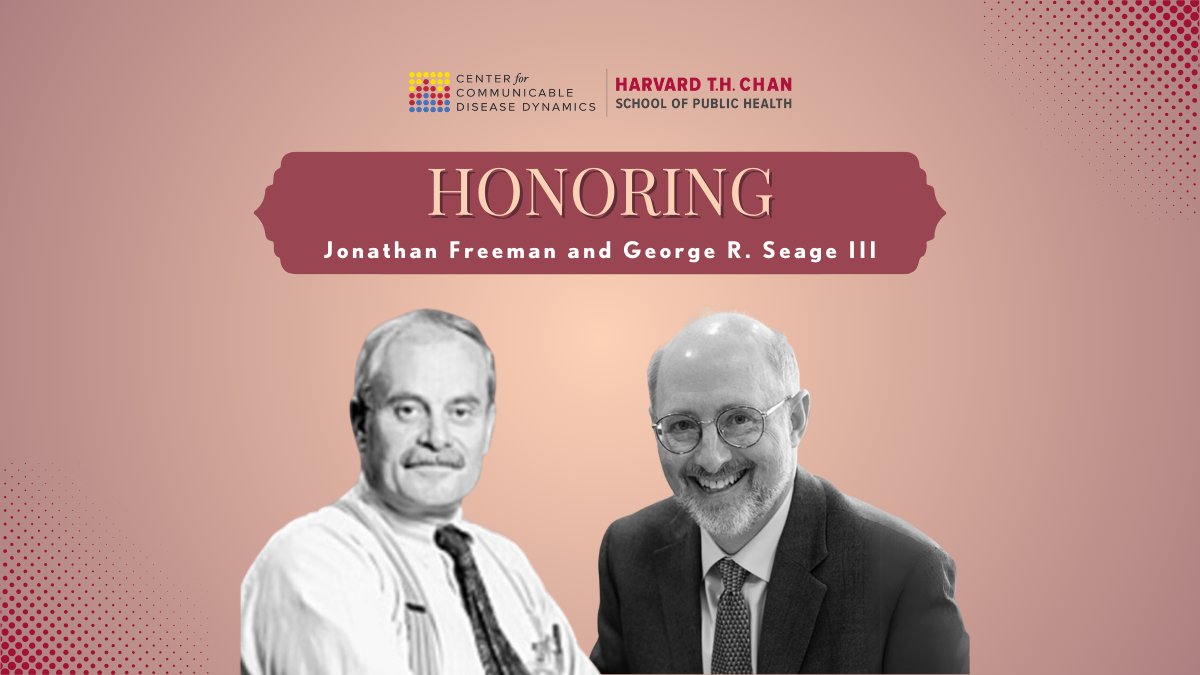
April 29, 2025
20th Freeman-Seage Symposium on Infectious Disease Epidemiology

This event is open to the Harvard Longwood Community.
Schedule
1:30 – 4:30PM in the Kresge G3 auditorium
- 1:30PM – Welcome and Introduction by Marc Lipsitch, DPhil, Professor of Epidemiology
- 1:35PM – Transmission or Importation? Using SARS-CoV-2 Genomics to Guide Infection Control protocols by Mui Pham, Postdoctoral Research Fellow, Epidemiology
- 1:50PM – Biological drivers of frequency dependent selection in post-vaccine pneumococcal populations by Indra Gonzalez Ojeda, PhD Student, Physics
- 2:05PM – Alcohol use, alcohol outlets, and spatial HIV epidemic burden in South Africa by Domonique Reed, Postdoctoral Research Fellow, Epidemiology
- 2:20PM – Quantifying the impact of antibiotic use and genetic determinants of resistance on Neisseria gonorrhoeae lineage dynamics by David Helekal, Postdoctoral Research Fellow, Epidemiology
- 2:35PM – Q&A Session
- 2:50PM – BREAK
- 3:10PM – Evolutionary and host demographic factors shaping the diversity of a multilocus antigen in Neisseria gonorrhoeae by QinQin Yu, Postdoctoral Research Fellow, Immunology and Infectious Diseases
- 3:25PM – Equity considerations in COVID-19 vaccine allocation modelling: a methodological study by Eva Rumpler, PhD Candidate, Epidemiology
- 3:40PM – Comparing strategies to introduce two new antibiotics that minimize drug resistance in gonorrhea: a modeling study by Madeleine Kline, MD-PhD Candidate, Population Health Sciences
- 3:55PM – Q&A Session
- 4:20PM – Closing remarks by Megan Murray, Professor in the Department of Epidemiology
4:45-6:30PM in the FXB Atrium
- Spatiotemporal variability of malaria transmission in the Brazilian Amazon driven by weather and climate patterns by Nicholas J. Arisco, Postoctoral Research Fellow, Global Health and Population
- Can Group B Streptococcus (GBS) strain diversity in carriage be recovered from low-abundance metagenomic samples? A simulation study by Ruchita Balasubramanian, PhD Candidate, Epidemiology
- Surveillance for TB drug resistance using routine rapid diagnostic testing data: Methodological development and application in Brazil by Sarah Baum, PhD Student, Global Health and Population
- Focusing a Viral Risk Ranking Tool on Prediction by Katherine Budeski, PhD Student, Epidemiology
- Exploring SARS-CoV-2 Intrahost Evolution and Transmission with Deep Sequencing Genomic Surveillance Data by Léa Cavalli, PhD Candidate, Epidemiology
- Why should we study indirect effects of antimicrobial treatment strategies? by Juan Gago, Postdoctoral Research Fellow, Epidemiology
- Linking Genetic Distance to Invasiveness in Streptococcus pneumoniae by Sophia Lerebours (Undergraduate student at Harvard College), Indra Gonzalez Ojeda (PhD Student, Physics), Marc Lipsitch, DPhil (Professor, Epidemiology)
- Prevalence of Chronic Pulmonary Aspergillosis in Tuberculosis Populations: A Systematic Review and Meta-Analysis by Alicia Madden, Research Assistant, Global Health and Social Medicine
- Mining and Malaria: Addressing Mobility and Access in the Guyana Shield by Andrea Parra Salazar, PhD Student, Global Health and Population
- Heterogeneous constraint and adaptation across the malaria parasite life cycle by Sarah Perkins, PhD Candidate, Biology
- Low-Cost Approaches for Detecting Antimicrobial Resistance in Bacterial Infections in Resource-Limited Settings: A Scoping Review by David Roach, Instructor in Medicine
- Seasonal forcing and waning immunity drive the sub-annual periodicity of the COVID-19 epidemic by Ilan N. Rubin, Postdoctoral Research Fellow, Epidemiology
- Target trial emulation with test restricted sampling to estimate COVID-19 booster vaccine efficacy: a cohort study by Beau Schaeffer, PhD Student, Epidemiology
- Isoniazid Preventive Therapy (IPT) and TB infection in intrahousehold contacts by Oscar Zazueta Fierro, PhD Student, Population Health Sciences
ⓘ Harvard Chan School hosts a diverse array of speakers, invited to share both scholarly research and personal perspectives. They do not speak for the School, and hosting them does not imply endorsement of their views, organizations, or employers.